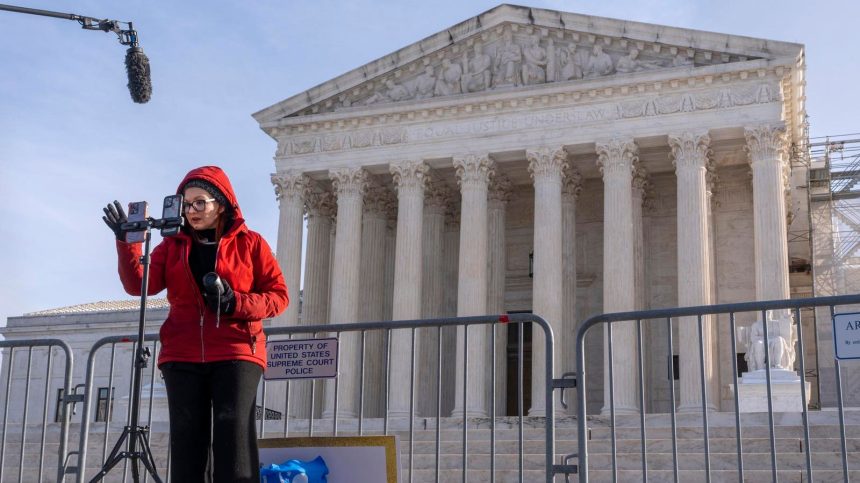The fate of TikTok in the United States hangs precariously in the balance following oral arguments before the Supreme Court. The justices heard arguments concerning a federal law mandating TikTok’s divestiture from its Chinese parent company, ByteDance, or face a nationwide ban. While a final decision is yet to be rendered, the justices’ line of questioning signaled a potential affirmation of the ban unless TikTok complies with the divestiture requirement. This raises the specter of the popular video-sharing app vanishing from American screens as early as January 19th.
The central issue revolves around the First Amendment implications of the federal law. TikTok and its content creators contend that the ban constitutes an infringement on their free speech rights by effectively silencing the entire platform. Conversely, the government argues that the ban is a crucial national security measure, citing concerns over ByteDance’s Chinese ownership and potential access to user data. Justices from both liberal and conservative wings of the court appeared unconvinced by TikTok’s arguments. They questioned the validity of TikTok’s First Amendment claims, given that the law explicitly targets ByteDance, a foreign entity, and its algorithm, rather than directly restricting user-generated content. Some justices even suggested that the case hinges more on TikTok’s desire to maintain its association with ByteDance than on any genuine suppression of speech. The justices also highlighted that the law doesn’t prohibit users from expressing themselves; it merely seeks to prevent a “foreign adversary” from exploiting user data.
Further emphasizing the justices’ skepticism, several questioned whether the ban would genuinely harm TikTok creators, implying they could simply migrate to alternative platforms. This line of questioning probes the uniqueness of TikTok’s platform and its algorithm, challenging the notion that it offers an irreplaceable experience. The historical precedent of the U.S. restricting foreign government ties to broadcasting companies was raised, further underscoring the government’s concerns about data collection and national security. This historical context adds weight to the government’s position, portraying the TikTok ban as a contemporary manifestation of long-standing anxieties about foreign influence.
While the court seemed inclined to uphold the ban, they did not entirely dismiss TikTok’s arguments. Some justices questioned the government’s rationale, suggesting less restrictive alternatives, such as requiring a warning label about potential Chinese manipulation of content. This alternative approach acknowledges the potential risks associated with TikTok’s ownership while also seeking to preserve the platform for American users. Furthermore, justices questioned how the TikTok situation differed from other foreign-owned publishers operating in the U.S., raising concerns about potential inconsistencies in applying the law. The use of sealed evidence by the government, inaccessible to TikTok’s legal team, also drew scrutiny, raising questions about transparency and due process.
The timing of the Supreme Court’s decision is critical. While the court typically takes months to issue rulings, the looming January 19th deadline suggests an expedited decision. The court’s refusal to temporarily halt the ban while considering the case further strengthens the expectation of an imminent ruling. However, a delay remains possible if the justices require more deliberation time. This potential delay would offer TikTok a temporary reprieve and provide more time for legal maneuvering and potential negotiations.
Adding another layer of complexity, President-elect Donald Trump, though not formally involved in the case, has expressed opposition to the ban and requested a stay until after his inauguration. This intervention introduces a political dimension to the legal proceedings, suggesting the possibility of a negotiated resolution outside the courtroom. While the court isn’t obligated to heed Trump’s request, his intervention highlights the broader political context surrounding the TikTok ban.
Should the ban take effect, the consequences for TikTok users remain uncertain. App stores would be prohibited from hosting TikTok, preventing downloads and updates, effectively rendering the app obsolete over time. The ban also affects internet service providers that facilitate TikTok’s distribution, potentially leading to a complete shutdown of the platform in the U.S. However, alternative scenarios, such as relocating servers outside the U.S., might temporarily circumvent these restrictions, albeit with long-term usability challenges.
The ongoing legal battle underscores the complex intersection of national security concerns, free speech principles, and international business relations in the digital age. The Supreme Court’s decision carries significant implications for the future of TikTok in the U.S. and may set a precedent for regulating other foreign-owned social media platforms. The case highlights the challenges governments face in balancing national security interests with individual rights in an interconnected global landscape.



